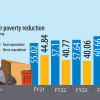No good news for the unemployed youth

Historically, the promise of job creation has been a cornerstone of political pledges. When Awami League came to power in 2009, it vowed to provide employment to every household. But we all know how that turned out. Such lofty promises are difficult to fulfil when contrasting priorities emerge and bureaucrats take over, but there is no denying the importance of sustained efforts—"sustained" being the keyword—to ensure proper utilisation of the youth. Unfortunately, the recently proposed budget has been frustrating in that regard. Not only does it offer no way out of the present job crisis, but it also betrays no intension of eradicating well-known barriers to employment such as corruption; if anything, it seems to have encouraged it. Case in point: allowing whitening of black money.
Corruption, it bears repeating, stifles economic growth and deters investment, thus limiting job opportunities. It is because of the widespread corruption and lack of targeted measures in Bangladesh that the number of the unemployed, especially among educated youths, has reached alarming levels. Many are forced to settle for low-paying jobs despite being overqualified. Many are seeking employment abroad through illegal and often precarious channels due to lack of opportunities. Businesses and entrepreneurs are facing various systemic hurdles. Even a large number of vacant positions in the public sector remain unfilled. The budget, as the nation's roadmap to secure its financial future, has missed the chance to address all such issues affecting the job market. Its poor allocations for education and health sectors, vital for the development of human resources, also do not help.
This reality—a stagnant job market and the uncertainties surrounding it—has been weighing heavily on young undergraduates. A recent survey by the Aachol Foundation, as reported by Prothom Alo, highlights the mental health struggles of university students with 55 percent of the surveyed expressing anxiety about their future careers. The intense pressure to succeed, coupled with an environment rife with bullying, harassment, and dissatisfaction with educational standards, has led to significant mental health issues among them, including depression and suicidal thoughts. This, among other things, indicates the growing disconnect between the education and employment sectors, with many students being forced to consider a career overseas.
This is bad news for the country. Clearly, what we are missing is an enabling environment for the nurturing and utilisation of young talents. We, therefore, urge the authorities to treat unemployment as a national emergency, with comprehensive strategies to stimulate job creation, curb corruption, and support both undergraduates and graduates as well as other job seekers. Our future and well-being depend on it.


 For all latest news, follow The Daily Star's Google News channel.
For all latest news, follow The Daily Star's Google News channel. 









Comments